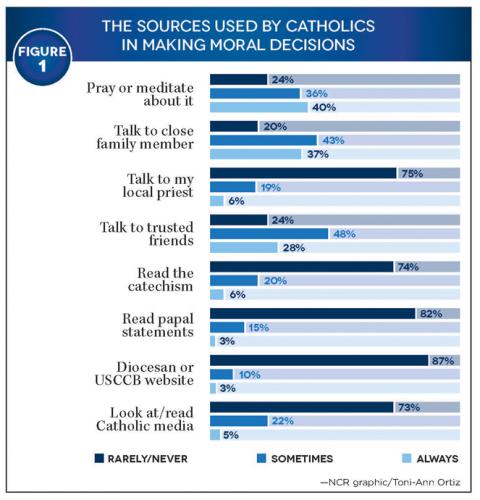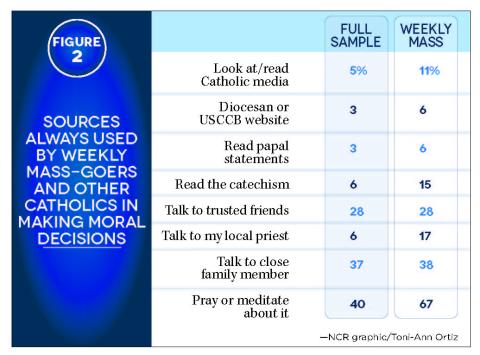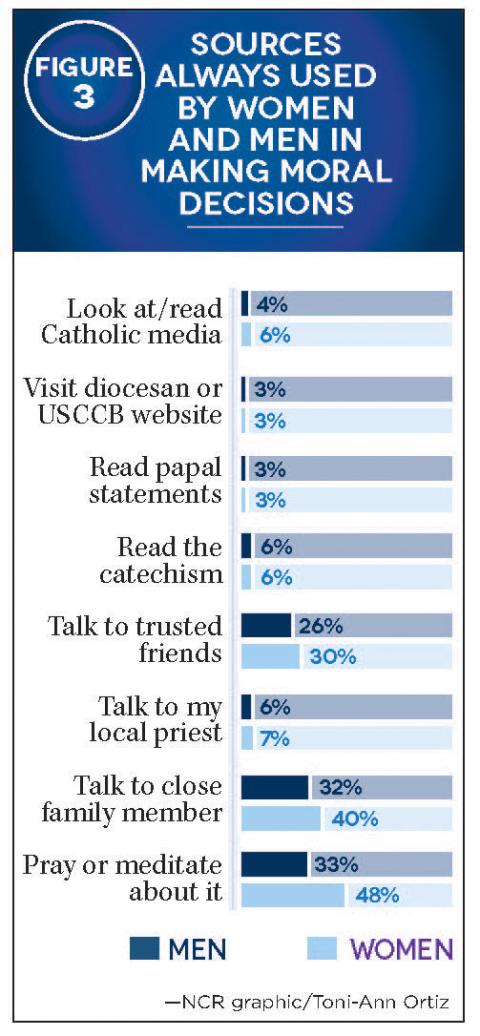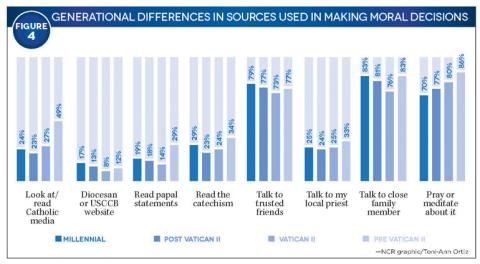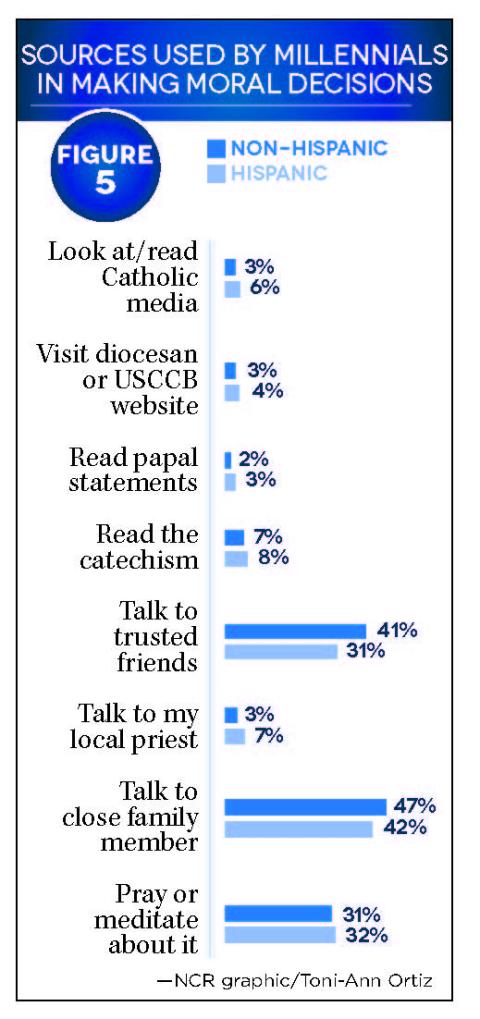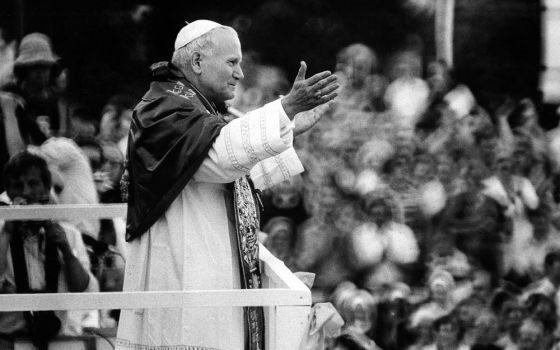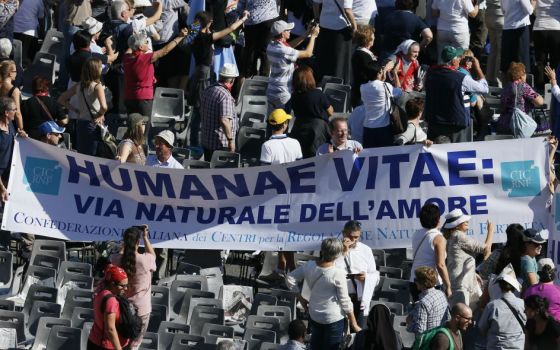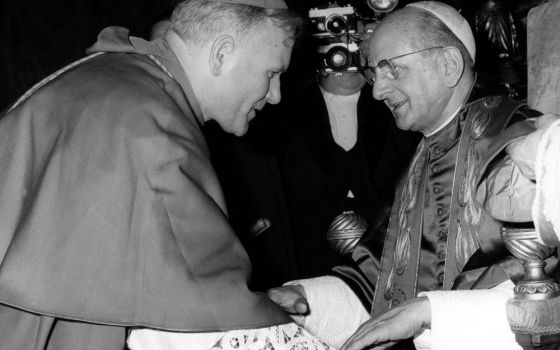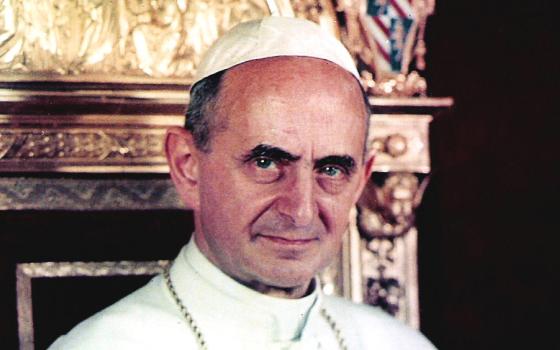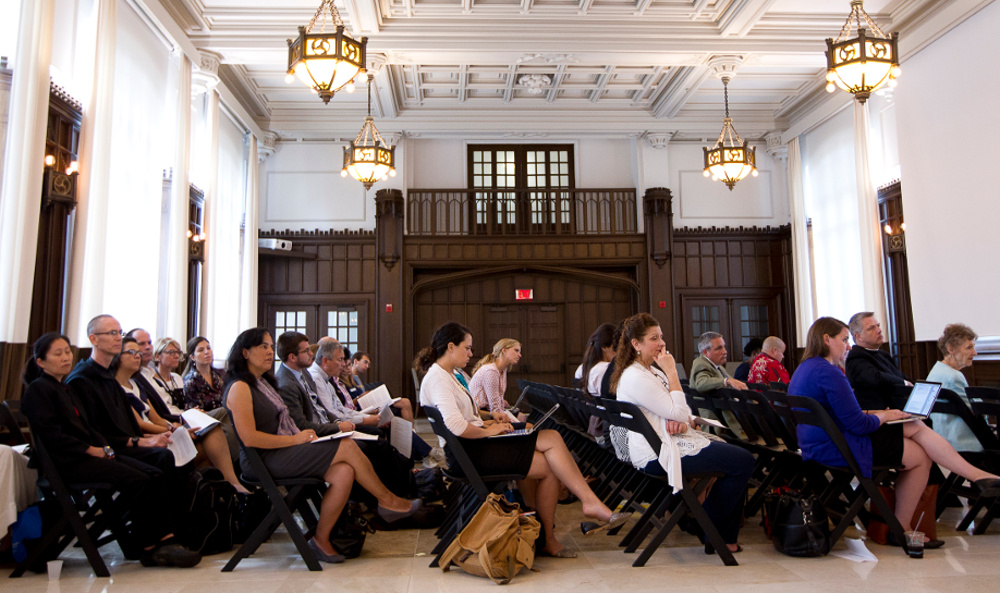
Attendees listen to Catholic scholars release a statement reaffirming Blessed Paul VI's 1968 Humanae Vitae encyclical on human sexuality at the Catholic University of America in Washington in 2016. (CNS/Tyler Orsburn)
Editor's Note: Because of a technical error, the five charts that should have appeared with this article did not appear in the original post. We have corrected this problem, and the charts now appear.
Fifty years ago, Pope Paul VI used the teaching authority of the church to bar Catholics from using artificial birth control. His encyclical Humanae Vitae unintentionally transformed Catholics' relationship to church authority, so that today two-thirds (66 percent) of American Catholics say that individuals should rely on their own authority in making decisions about contraception. Almost nine in 10 say that one can be a good Catholic without adhering to church teaching on contraception.
A relatively similar pattern of autonomy is evident, too, in regard to nonmarital and same-sex relationships, such that today two in three Catholics, for example, support same-sex marriage.
Pope Francis has refocused Catholic attention on the importance of conscience in decision-making through the two Synod of Bishops on the family he convened in 2014 and 2015 and Amoris Laetitia, his exhortation in response to the bishops' deliberations.
He revisited this idea in January during his annual address to members of the Roman Rota, the tribunal that evaluates appeals in marriage annulment cases, by reiterating that a well-formed conscience has "a decisive role" in complicated marital situations. He called then for renewed pastoral efforts dedicated to helping people develop an enlightened and faith-infused conscience.
Despite the attention conscience has received since 1968 and the accumulation of more than 40 years of well-regarded survey data tracking Catholics' attitudes on sexual morality and their construal of church authority, we know surprisingly little about how Catholics inform their conscience.
Moral decision-making
Newly available data from the Sixth National Survey of American Catholics (gathered in April 2017) illuminates Catholics' moral decision-making process. The question asked: "When you have an important moral decision to make, which, if any, of the following activities or sources do you use usually look to for guidance?"
Irrespective of what specific moral decisions respondents may have had in mind when answering the question, the overall pattern of responses underscores the significance of private prayer and friends and family rather than official church sources (see Figure 1).
Forty percent of Catholics say that they always pray or meditate in making an important moral decision, 37 percent talk to close family members and 28 percent talk to trusted friends. By contrast, only 6 percent always talk to their local priest or read the catechism, and even fewer consult papal statements (3 percent) or their diocesan or the U.S. bishops' website (3 percent). One in 20 say that in such situations they always use Catholic news media.
While additional numbers of Catholics use all of these sources sometimes, it is nonetheless striking that three in four rarely or never talk to their local priest on such matters or read the catechism. And over 80 percent rarely or never turn to papal encyclicals for guidance, or to diocesan or U.S. bishops' websites.
Weekly Mass-goers are twice as likely as others to consult with a priest (17 percent) and read the catechism (15 percent) and in general to turn to official Catholic sources. Yet even for such highly committed Catholics, these sources do not eclipse the significance of prayer and of family and friends (see Figure 2).
Prayer, in particular, stands out as the most routine way in which weekly Mass-goers reflect on their moral decisions, with the category "always" used by two-thirds (67 percent) of them.
Gender differences
It's well established that women are more conscientious than men and that they bring this greater conscientiousness to their religious engagement. Catholic women's comparatively greater conscientiousness when it comes to making moral decisions is evident in the large proportions of them who always turn to prayer and family and friends.
However, they are not any more likely than men are to draw guidance from official church sources. As Figure 3 shows, there are essentially no gender differences in the small proportion who always consult a priest or who use the catechism, papal encyclicals or diocesan/bishops' websites.
Generational differences
There are few generational differences in the sources used for moral guidance. As Figure 4 shows, older Catholics, the pre-Vatican II generation who came of age prior to 1960 and who are currently in their 70s and 80s, are always or sometimes* more likely than others to pray, to talk with their local priest, to consult Catholic media and to read the catechism and papal statements.
It is also noteworthy that millennial Catholics (those born since 1979) show a comparatively greater tendency to turn to family and friends rather than prayer when making moral decisions.
Not surprisingly, given this generation's digital competence, they are also slightly more likely than older Catholics to look at diocesan/bishops' websites (see Figure 4).
Catholics under age 40 (millennials) are composed of almost equal numbers of Hispanics and non-Hispanics. Despite their different socioeconomic and political characteristics, there is little variation in how they go about making moral decisions. (See Figure 5.)
Though they are the most routine sources always* used by both groups, a larger proportion of non-Hispanics than Hispanics turn to family (47 percent: 42 percent) and friends (41 percent: 31 percent) for moral guidance; and Hispanics (7 percent) are slightly more likely than their age peers (3 percent) to seek guidance from their local priest (7 percent: 3 percent) and consult Catholic media (6 percent: 3 percent).
The fact that Catholics typically turn to prayer and meditation in discerning important moral decisions points to the enduring relevance of faith in their negotiation of complex moral circumstances. Amid a societal decline in religious affiliation, a decline in the church and sacramental participation habits of those who remain Catholic, and against the backdrop of Catholics' disagreement with various elements of official church teaching on sexual morality, it is important to recognize that faith engagement still matters.
With lived experience a well-recognized source of legitimate authority in Catholic moral theology, it also makes sense that Catholics would trust close family members and friends for guidance in their moral decision-making. Reflective conversation with others can help broaden the individual's perspective on their particular situation and nudge them to consider courses of action they might not otherwise have entertained, or by the same token, modify or refrain from what they were initially planning to do.
Church resources underused
The theological relevance of prayer and interpersonal dialogue in conscience formation notwithstanding, it is striking, nevertheless, that Catholics make so little recourse to other important resources in Catholicism.
Although Catholics tend to appreciate their local priests (e.g., 35 percent are "very satisfied" with the leadership of their parish priest), they do not appear to consider them as theological or moral sounding boards in the context of their personal lives. That even so few regular Mass-goers talk to their priest about personally important decisions suggests that priests' functionality in Catholic lives is relatively circumscribed.
This situation itself may be related to priests being over-burdened with administrative and liturgical duties such that there is less opportunity to develop personal connections and the trust that can facilitate joint engagement in the process of moral discernment.
Further, in a time when searching the web has become second nature even for older people, the highly accessible and comprehensive website of the U.S. bishops' conference, for example, facilitates the dissemination of church teaching. Yet, this and other resources, such as the catechism and papal encyclicals (despite the latter's doctrinal richness and sociological breadth), are all underused.
The underutilization of official church sources does not mean that Catholics' conscience-formation is necessarily impoverished. The Catholic tradition is imbibed by Catholics in other ways, especially by Mass attendance and participation in the sacraments. Yet with fewer Catholics regularly attending Mass, the grounding of their consciences in Catholic ideas, and indeed in their contested argumentation, may be further diluted.
Moreover, millennial Catholics are part of the most secular generation, and thus their relatively greater reliance on family and peers — many of whom are likely to be religiously unaffiliated — may further secularize the content of their moral guidance as they progress through the life course.
In any event, as church officials openly broach the more inclusive integration of an ever-growing number of "irregular" Catholics, it may be timely both for Catholics to take stock of the breadth of resources available for moral discernment, and for church officials to creatively revisit how to make the church's resources more heavily accessed.
*Two sentences in this story were updated to clarify that Figure 4 refers to use of sources "always or sometimes," and that Figure 5 refers to sources "always" used by both groups.
[Michele Dillon is professor of sociology at the University of New Hampshire and the author most recently of Postsecular Catholicism: Relevance and Renewal.]
Advertisement

